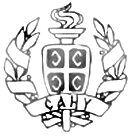Приказ основних података о документу
Justinian’s πάτριος φωνή
| dc.creator | Nedeljković, Vojin | |
| dc.date.accessioned | 2019-04-12T09:05:34Z | |
| dc.date.available | 2019-04-12T09:05:34Z | |
| dc.date.issued | 2016 | |
| dc.identifier.issn | 0350-7653 | |
| dc.identifier.uri | http://www.doiserbia.nb.rs/Article.aspx?id=0350-76531647055N | |
| dc.identifier.uri | https://dais.sanu.ac.rs/123456789/5673 | |
| dc.description.abstract | In the Justinianic Novellae, repeated occurrences of the phrase πάτριος φωνή, meaning the Latin language, are generally believed to be indicative of Justinian’s favourable stance towards Latin culture, Roman tradition, and his own roots. Per se, the importance and dignity of Latin needed no advocacy in the actual environment of the sixth-century Constantinople: not only was the idiom in wide official use, but a fair share of literary production was in Latin, and proficiency in that language was normal with the many admirers and connoisseurs of Roman antiquities. The usual understanding is that by calling Latin the “father tongue” Justinian never emphasized the contingent fact of its being his own first language, but rather referred to Latin as the primary language of the Roman people and the traditional vehicle of high administration throughout the Empire. In the present paper the use of πάτριος φωνή (or π. γλωττα) is examined in the wider context of earlier, contemporary and later Greek sources, in which it normally means the native language of a foreign individual or ethnicity as opposed to the Greek of the author and his readers; the instances involve a large number of foreign languages, including contemporary spoken idioms as well as traditional languages of different communities. However, the question whether πάτριος φωνή ever became a context-free denotation of Latin viewed as the traditional language, by all appearances, is to be answered to the negative. On the other hand, the phrase πάτριος φωνή often assumes the specific task of ‘flagging’ instances of code-switching in Greek texts, and it is this special purpose that it seems to fulfill more than once in the Novellae as well. | en |
| dc.publisher | Belgrade : Institute for Balkan Studies, Serbian Academy of Sciences and Arts | |
| dc.rights | openAccess | |
| dc.rights.uri | https://creativecommons.org/licenses/by-nc-nd/4.0/ | |
| dc.source | Balcanica | |
| dc.subject | Late Greek | |
| dc.subject | Late Latin | |
| dc.subject | bilingualism | |
| dc.subject | flagged code-switching | |
| dc.subject | language policies in the Late Roman Empire | |
| dc.subject | Justinian’s reconquista | |
| dc.title | Justinian’s πάτριος φωνή | gr |
| dc.type | article | en |
| dc.rights.license | BY-NC-ND | |
| dcterms.abstract | Недељковић, Војин; Јустиниан’с πάτριος φωνή; | |
| dc.citation.spage | 55 | |
| dc.citation.epage | 73 | |
| dc.citation.issue | XLVII | |
| dc.identifier.wos | 000395301200004 | |
| dc.identifier.doi | 10.2298/BALC1647055N | |
| dc.type.version | publishedVersion | |
| dc.identifier.fulltext | https://dais.sanu.ac.rs/bitstream/id/17731/bitstream_17731.pdf | |
| dc.identifier.rcub | https://hdl.handle.net/21.15107/rcub_dais_5673 |

